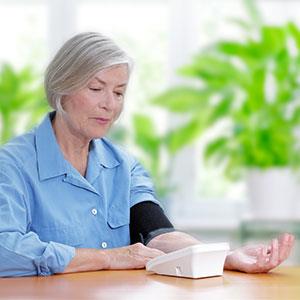
Taking blood pressure medications as prescribed may help people who are older than 65—including those who are frail and have other health conditions—live longer, according to a large study published in Hypertension. The observed survival benefit, however, was more striking among healthier older adults.
Experts say that the study fills an important gap by demonstrating that blood pressure-lowering medications may boost survival among frail elderly groups who are often excluded from clinical trials. The goal was to assess the relationship between taking blood pressure medications as directed (also known as being medication adherent) and the risk of dying in frail versus healthier older adults. Overall, greater adherence to blood pressure medications was linked to a lower likelihood of dying during the study period.
Researchers began with data from nearly 1.3 million people 65 years and older who had received three or more prescriptions for high blood pressure medications between 2011 and 2012. These individuals lived in the Lombardy region of Italy. Adherence was measured by the proportion of time that they had prescriptions for blood pressure-lowering medications over seven years. Within this period, 255,228 people died and were then compared with similar peers who survived based on age (an average of 76 years), gender, and health status. The score for health status—good, medium, poor or very poor—accounted for many other health factors.
During the seven years of follow-up, the likelihood of dying during was 16% for people who were in good health at the start of the study and rose to 64% for those who were in very poor health. In addition, compared with patients with very low adherence to blood pressure medications (prescriptions covering < 25% of the follow-up period), those with high adherence (prescriptions for >75% of time) were less likely to die of any cause. Those with high adherence were found to be:
- 44% less likely to die if they were in good health
- 33% less likely to die if they were in very poor health
Taking blood pressure medications was also linked to a lower chance of dying from heart or blood vessel disease.
Compared with others, those who died during the study more often took only one related medication (most often diuretics), had more medical conditions overall and took more medications as a result.
The authors write that "antihypertensive treatment is beneficial in frail old patients, but that the extent of the benefit may be less than that achieved by healthier old individuals."
Still, the results of this large population study reinforce the protective role these medications may have for older adults. Because this is observational research, it gives information about only the association between blood pressure medicines and the likelihood of dying. It also uses active prescriptions of blood pressure drugs as an indicator of adherence.
For more information on blood pressure, visit www.CardioSmart.org/HighBP.
"Antihypertensive Treatment in Elderly Frail Patients," Hypertension,
June 8, 2020.
Learn about CardioSmart's editorial process. Information provided for educational purposes only. Please talk to your health care professional about your specific needs.